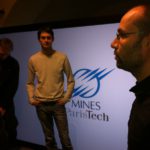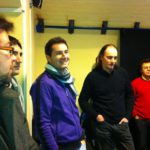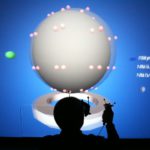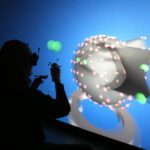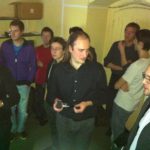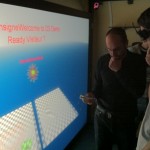Recently the VRGeeks of Paris have visited the VR Center of the Ecole des Mines de Paris. It’s the house of Philippe Fuchs, Alexis Paljic and Laure Leroy just to name some. They have kindly accepted to make us visit their center and we had a great evening there !!
They have one big stereoscopic wall which they’re using for :
Immersive Modelling from Alexis Paljic on Vimeo.
Virtual Reality for Car Interior Design from Alexis Paljic on Vimeo.
Immersive Design from Alexis Paljic on Vimeo.
We’re looking for our next visit, so if you’re interested in hosting a VR Geek evening, let me know!
Here’s a description of their work :
Mines Paris Tech Robotics Centre – Virtual and Augmented Reality research
The goal of VR is to allow one or more users to perform sensori-motor and cognitive activities in an artificial environement. This environment can be imaginary, symbolic, or simulate real objects or situations. This leads to three topics : creating an interactive virtual environment, studying the human in this environment, and finally the immersion and interaction of this person in the environment. We focus our research on the third topic : the challenge is to involve as much as possible natural human behaviours in the design of the interface. Moreover, the interface design must consider both sensori-motor and cognitive levels.
This approach is applied in our current research and always includes evaluations. Our current works include :
– VR for design: The industry, especially automotive and aerospace, has expressed a strong need for immersive tools to modify shapes and volumes. The challenge is twofold : 1. offer easy to use and intuitive shape deformation tools and 2. keep the data consistent with CAD description. In the VR for design topic, we also conduct our research on virtual reality immersive review of multiphysics simulations (thermal, acoustic, or mechanic simulations). To address these challenges, we offer interaction techniques and related visualization methods.– Visual interfacing in an immersive system: the goal is to quantify the difference between natural and immersive vision and also to offer techniques to improve visual perception in interactive systems. These improvements aim at reducing visual fatigue, improve object shapes and size perception, or propose seamless techniques to locally increase display resolution.
– VR for therapy : We conduct immersion and interaction research in a project meant to implements VR applications for the rehabilitation of stroke patients, and also treatment of neurodegenerative disorders. The objective is to develop a tool for the evaluation and the rehabilitation of individual’s functional capabilities and for his return to autonomy. Different set-ups are proposed, ranging from a VR rehabilitation platform in hospitals, functional and motor rehabilitation VR centres, to portable low-cost systems in people’s residence.
recent publications on these subjects :
– “A study of Perception of volumetric rendering for immersive scientific visualization”
Nan Wang, Alexis Paljic, Philippe Fuchs. ICAT 2010, International Conference on Artificial Reality and Telexistence, December 1-3, 2010– “High Resolution Insets for Stereocopic Immersive Displays : a Method for 3D Content Dependent Inset Boundaries”
Alexis Paljic, Caroline de Bossoreille, Philippe Fuchs, and Gabriel Soubies. VRST 2009 – 16th ACM Symposium on Virtual Reality Software and Technology. Wed, Nov. 18 – Fri, Nov. 20, 2009– “D3: an Immersive aided design deformation methodâ€
Vincent Meyrueis, Alexis Paljic, Philippe Fuchs. VRST 2009 – 16th ACM Symposium on Virtual Reality Software and Technology. Wed, Nov. 18 – Fri, Nov. 20, 2009– “Some experiments about shape perception in stereoscopic displaysâ€
Leroy L., Paljic A., Fuchs P., Moreau G. IS&T/SPIE Symposium on Electronic Imaging, Number 7237-45, 18-22 January 2009, San Jose, California USA.– “Study of stereoscopic shape perception for virtual designâ€
Leroy L., Fuchs P., Paljic A., Moreau G. 18th International Conference on Artificial Reality and Telexistence, December 1-3, 2008, Keio University, Yokohama, Japan
